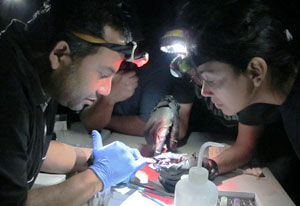CDC views global health as key priority
July / August 2014 | Volume 13, Issue 4

Photo courtesy of CDC Global Health
Globalization, the rise of foreign travel, an increased risk of bioterrorism and other developments have spurred the U.S. Centers for Disease Control and Prevention (CDC) to evolve into an international global health leader. For nearly 70 years, the CDC has nurtured partnerships around the world to protect and improve health by strengthening disease surveillance, implementing evidence-based policies and providing training to build vital health capacity in low-resource settings.
"The health security of the United States is only as strong as the health security of all nations around the world," said CDC Director Dr. Tom Frieden. "We are all connected by the food we eat, the water we drink and air we breathe. Stopping outbreaks where they start is the most effective and least costly way to prevent disease and save lives at home and abroad - and it's the right thing to do."
He noted that the CDC and its partners responded to more than 250 disease outbreaks in 2013, adding, "No single country can deal with these health threats alone. Cooperation between countries has tremendous impact in early detection."
The agency, based in Atlanta, Ga., has deployed more than 300 public health professionals overseas, in addition to about 1,300 locally employed staff who work in some 60 countries. Many are embedded in national health ministries or with the WHO, where they provide advice and technical assistance. In addition, hundreds of staff are sent from headquarters each year, as needed to provide temporary help.
The CDC has four primary goals for its global health agenda - to improve health and well-being around the world, respond to potential security threats such as the Ebola and influenza viruses, build countries' public health workforce and laboratory capacity, and maximize the impact of its own global programs.

Photo courtesy of CDC Global Health
Epidemiologists trained through CDC programs
collaborate to identify outbreaks of diseases, which
can rapidly spread around the world.
Technical rigor and a commitment to science and evidence provide the foundation for CDC's global engagement. Also integral to the agency's global health efforts are partnerships, primarily with health ministries and UN entities - especially the WHO and child-focused UNICEF - and with NGOs, health institutions, multilaterals, universities and the private sector.
The CDC has worked with countries to build laboratory networks, improve surveillance capabilities, create health information systems, develop service delivery models and strengthen workforce capacity. Once established, this infrastructure can be leveraged by the CDC and other organizations - such as the President's Emergency Plan for AIDS Relief (PEPFAR) - to further improve public health.
Over time, the expansion of countries' capacity to implement and evaluate their own public health activities lessens the need for direct U.S. support and increases country ownership and sustainability of public health programs.
CDC Global Health Research
Access a collection of online global health resources from the Centers for Disease Control and Prevention (CDC).
Read global health articles from and about the CDC.
- Global health and the US Centers for Disease Control and Prevention
The Lancet, July 5-11, 2014
- CDC launches new noncommunicable disease training for field epidemiologists
CDC's Our Gobal Voices blog, November 21, 2013
- About CDC in Mozambique
- New Influenza virus discovered in Guatemalan fruit bats
CDC Seasonsal Influenza (Flu) news, February 27, 2012
- Spotlight on bat flu
CDC Seasonsal Influenza (Flu) news, February 9, 2012
- Working together to help strengthen Kenya's capacity for birth defects prevention: A great collaborative start
CDC's Our Gobal Voices blog, January 6, 2014
- About the October 2010 Haiti cholera outbreak
- U.S. safer when CDC works with other countries to fight infectious diseases [in Uganda and Vietnam]
CDC news, January 30, 2014
- Rapidly building global health security capacity – Uganda demonstration project, 2013
Morbidity and Mortality Weekly Report, January 31, 2014
To view Adobe PDF files,
download current, free accessible plug-ins from Adobe's website.